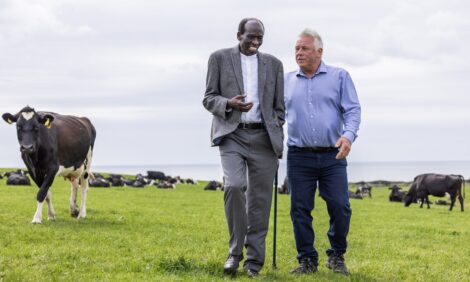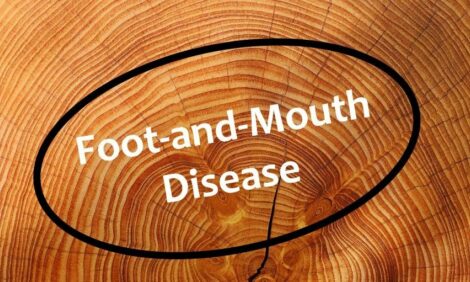



FMD: The Way Towards Global Control
Over 500 participants, participated in the OIE/FAO Global Conference on Foot and Mouth Disease to discuss a way towards global control, reports the World Organisation for Animal Health (OIE).The Conference, which involved OIE national Delegates, stakeholders, representatives of FAO and other partner international organisations, key global donors, non-governmental and farmers’ organisations, was organised with the generous contribution of the Servicio Nacional de Calidad y Salud Animal (SENACSA) of Paraguay, the Ministério da Agricultura, Pecuária e Abastecimento of Brazil, the European Commission, Spain and many other sponsors.
Below the final recommendations unanimously adopted by the participants:
Considering that:
Foot and mouth disease (FMD) has for centuries been known as a serious threat to the health and welfare of the domestic and wild animal ruminant and swine population of the world, with negative impacts on the livelihoods of animal keepers;
The current lack of awareness and knowledge of the impacts of FMD at the individual producer level, and especially for the poorest farmers and the false perception that FMD is not a priority disease for poverty reduction;
The production, performance and use of large ruminants for ploughing and traction are seriously diminished when infected with FMD. Production and efficiency is further diminished in terms of quality and quantity of dairy products and weight gain ratios;
Countries infected with FMD are more prone to food insecurity as a result of the impact of FMD at household level and through reduced access to local, national and international markets and of animal draught power for agriculture;
Seventy countries in the world are already officially recognized by the OIE as free from FMD with or without vaccination while more than 100 countries are still either considered as endemically or sporadically infected with the disease;
The need of a strong commitment of all countries at a high political level to harmonise global, regional and national policies for FMD control;
The FMD virus serotypes and strains are distributed into several major virus ecological setting or reservoirs, each containing distinct regional viral strains from which new variants may emerge, which creates a demand for advanced laboratory services and technical advice to select appropriate vaccines;
The persistence of the FMDV in certain wild animals will remain a threat to the domestic ruminant population necessitating the need to monitor the disease in wild and feral animal populations and to control the disease by separating species and subpopulations of animals with different disease status;
Unprecedented globalization of trade and movement of people and animals opens the door for any virus strain to infect any part of the world; Regional long term efforts will be needed to address the threats of FMD viruses and animal reservoirs or environmental persistence;
OIE official recognition of country and zonal freedom from FMD is an important element in the drive towards the global control of FMD and the facilitation of trade in animals and animal products;
Many developing and in transition countries are in need of assistance as they lack the necessary resources and effective veterinary services to initiate, implement or sustain a national disease control program for FMD;
Initiating an FMD control program with limited financial resources requires targeted technical support and guidance to optimize the strategy and actions to achieve rapid gains on the investment, that could stimulate further cost effective public and private expenditures;
The control and eventual eradication of FMD in a country, region or worldwide could only be achieved if the international community recognizes that the control of FMD is a global public good that will benefit all populations and future generations;
Realising an ideal of global control of FMD will be a costly and long-term process relying heavily on the sustainable availability of sufficient public and private financial resources from Governments, producers and market chain actors, and the international donor community;
Good veterinary governance is an essential pre-requisite to ensure the efficient implementation of national programs and to encourage the establishment of sustainable public-private partnerships and international support for the control of FMD on a national, regional and global level;
There is an urgent need for research in vaccines that will improve the access of countries to good quality vaccines that are fit for purpose against the prevailing field strains of the FMD virus in each virus reservoir, in each relevant species, and which can be cost effective and used in challenging environmental conditions;
There is a need for more research on the risk of products from different susceptible species imported from non-free countries;
Good examples of successful regionally co-ordinated approaches that have delivered freedom from FMD in part or whole of the areas involved are seen in the European region, in South-East Asia and South America. These long term regional programs can provide important templates for formulating co-ordinated regional and national FMD control strategies in the other affected regions of the world;
There is a need for all countries currently affected by FMD to be able to enter into a regional co-ordinated program against FMD, but national resources are limited, a progressive control pathway towards FMD freedom with or without vaccination should begin with actions feasible in all affected countries and build progressively towards official recognition of FMD freedom of zones and countries;
Countries already free of the disease and able to support global control of FMD can contribute to a win-win situation resulting in a reduced poverty in infected countries and a reduced the risk to their own territory from virus reintroductions;
International standards of the OIE for good veterinary governance, the control methods for FMD, the production and use of vaccines, the trade in and movement of animals and animal products and the diagnosis of the disease are integral in formulating a strategy for the global control of FMD;
FAO and OIE signed several cooperation agreements including GF-TADs and Regional Animal Health Centers in different regions.
The Participants of the Conference Reiterate their Strong Support for a Globally Coordinated Approach to Control FMD and Recommend that:
- The OIE and FAO together with governments, producers and other international, regional and national role players and stakeholders must confirm and communicate the economic and social justification for recognizing officially the global control and eventual eradication of FMD as a global public good for the benefit of all populations and future generations.
- A strategy for the global control of FMD should be regarded as an international priority and should be developed as a matter of urgency jointly by the OIE and FAO preferably under the GF-TADs platform, in consultation with the relevant international, regional and national stakeholders and donor community.
- The OIE, FAO and other international and regional organizations concerned with FMD control realize a very high level of political communication to convince the high level policy makers in infected countries to consider FMD control as a priority using the threat of FMD transmission to neighbouring countries and regions as the thrust of their arguments.
- The FAO supported by the OIE and relevant international organisations conduct analytical work on the significant impacts of FMD on wealth creation, food security and gender issues, that would create a clear incentive for the governments and then the international community to increase investments in this sector and to do so in a more strategic manner.
- The OIE with the support of FAO pursue and further intensify its efforts to establish the application of good veterinary governance in developing and in transition countries to pave the way for sustainable public-private partnerships and involvement of the international donor community in support of a global strategy for the control of FMD.
- A strategy for the global control for FMD should incorporate and acknowledge existing and ongoing national and regional mechanisms that have already achieved progress in moving towards the regional control of FMD such as those of the Hemispheric FMD Eradication Plan for bi- or tri-national border zones, the CVP/MERCOSUR, SEAFMD, European Union and the EUFMD.
- The FAO and OIE should continue their efforts to promote long term, coordinated regional initiatives (roadmaps) for the progressive control of FMD covering each of the major virus reservoirs;
- OIE standards regarding quality of vaccines must be strictly respected by all countries worldwide, and mechanisms for quality assurance observed.
- Further research on the development of effective and quality vaccines and the availability of vaccines at diminished cost for all prevailing field strains of the FMD virus for all susceptible domestic animals be encouraged and expedited with the emphasis on the availability, cost-effectiveness and safe use under challenging environmental conditions.
- The OIE with the support of FAO and in collaboration with the international donor community, consider the establishment of vaccine banks for FMD vaccines in strategic locations and in support of regional FMD control programs.
- The establishment of and access to diagnostic facilities for the quick and efficient diagnosis of FMD be further enhanced through initiatives such as the OIE laboratory twinning program and the FAO laboratories network development program. Diagnostic tests must comply with standards of the OIE Manual of Diagnostic Tests and Vaccines for Terrestrial Animals and their inscription into the OIE register of diagnostic tests is recommended.
- The OIE continue to update existing international standards for FMD and encourage the official recognition of countries and zones listed free from the disease. In the updating of international standards the OIE should encourage further research to allow the safe trade in animal products without unjustified barriers to trade while recognizing the needs of developing and in transition countries which are still progressing along the pathway towards the progressive control or eradication of FMD, while protecting free countries from virus reintroduction and maintaining efficient veterinary services and field surveillance of the disease.
- should continue to support national capacity building of developing and in transition countries to comply with OIE standards, and should develop the methods, guides, tools, training and technical support to member states for the introduction and implementation of the progressive control pathway at national level;
- OIE and FAO organise as a next step a pledging conference with free and infected countries, and relevant organisations and donors, to support a global control program starting with relevant regional activities. The conference noted the candidature of the People’s Republic of China to host the next conference.
- In support of the global programme, the FAO and OIE organize regular global scientific meetings on FMD control, rotating around the affected regions. The conference noted the candidature of the Indian Council of Agricultural Research to host the next FMD global scientific meeting (in 2010 or 2011).
- The OIE develops its capacities for disease status recognition to support adequately the increase of number of countries and zones requesting recognition following the implementation of the new global control program.
- FAO with the political and normative support of the OIE should strengthen its capacities to technically support national and regional roadmap development for the progressive control of FMD at national and regional level, thereby contributing to the global control of this high-impact disease.
- The OIE and FAO should support epidemiological networks and strengthen cooperation for national, regional and global surveillance systems for FMD. Transparency and timely disease reporting to WAHIS is a key element to protect FMD free countries and zones and monitoring the progress of FMD control in endemic areas.
- National governments and regional organizations should actively encourage the support and cooperation of nature and wildlife conservation organizations when formulating national and regional control strategies for FMD control.
- National governments should in the development of disease control programs for FMD, give due consideration for the inclusion of compensation mechanisms in consultation with the private sector and the donor community.
July 2009



